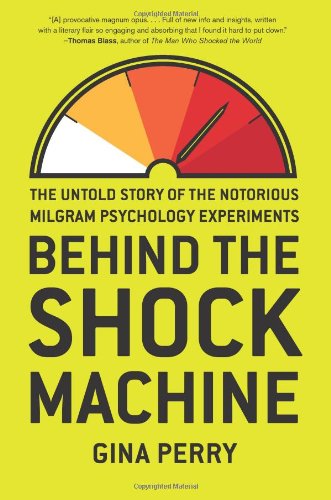
Behind the Shock Machine
The Untold Story of the Notorious Milgram Psychology Experiments
کتاب های مرتبط
- اطلاعات
- نقد و بررسی
- دیدگاه کاربران
نقد و بررسی

June 24, 2013
Perry puts one of the 20th century’s most contentious psychological studies under a microscope in this truly shocking history of the Milgram “obedience experiments,” examining their origins, methodologies, aftermath, and criticisms. Yale University psychologist Stanley Milgram’s 1961 series of tests showed that 65% of participants would, under various circumstances, willingly administer high-voltage shocks to other participants. The findings made waves in scientific circles and in popular culture, and were used to account for atrocities like the Holocaust by demonstrating the disturbing ease with which seemingly normal people could be impelled to commit cruel acts. Perry, herself a psychologist, focuses largely on the means by which these devastating conclusions were drawn; in constructing her case, she draws from her own interviews with participants and recorded dialogue from the experiments. These details, combined with her journalistic approach, make the book easily accessible to laypersons—yet it’s incisive enough to appeal to other psychologists as well. Perry’s palpably unfavorable opinion of Milgram may leave some readers doubting the objectivity of her project, but there’s still much rewarding and entertaining material here (her discussion about the scientific experiment as a form of theater is particularly interesting). No matter how shocking, it seems that the show must go on.

August 1, 2013
The famed Stanley Milgram psychology experiments shocked the world by suggesting that a majority of humans are capable of cruelty when under the orders of an authority figure. In this book, a secret history of the experiments is revealed, debunking Milgram's most sensational claims. The experiments, conducted at Yale University in the early 1960s, have long been a staple of psychology textbooks. The setup is dramatic but simple: Subject A sits in a room with a "shock machine" and is instructed to shock an unseen Subject B if he fails a simple memory test. The study was advertised as collecting data on how punishment affects learning and memory, but in reality, Milgram was not shocking Subject B, instead carefully monitoring the behavior of Subject A. The experiment's surprising results indicated that 65 percent of the subjects administered shocks even after the actor playing Subject B screamed in pain or even complained of a heart condition. In a postwar environment still reeling from the horror of the Holocaust, the connection between the Milgram experiments and the behavior of the Nazis brought questions of human behavior and obedience into the national spotlight. However, much like the experiments themselves, Milgram's published results were replete with omissions and inconsistencies, casting doubt on his methodology and ethics. Perry, a psychologist who first presented her research in an award-winning Australian documentary, spent several years interviewing original participants, combing through archived transcripts of the experiments, analyzing unpublished data and meeting with psychologists who worked with Milgram at that time. The result is a passionate text that humanizes the subjects and provides nuanced, provocative context to the experiments. The author asks profound questions about what truths, if any, can be elicited from analysis of human nature in a constructed environment. It's about time someone wrote this book.
COPYRIGHT(2013) Kirkus Reviews, ALL RIGHTS RESERVED.

October 1, 2013
Psychologist Perry digs deep into the story behind psychologist Stanley Milgram's famous "obedience experiments," which led to the reformation of American Psychiatric Association ethics codes and inspired several fictional and reality TV programs. Here Perry interviews subjects involved in the experiments, who, believing they were participating in research on the effects of punishment on learning, were instructed to administer electric shocks to other participants taking memory tests. Many of the unwitting subjects were traumatized, thinking they had actually killed the other participant, and some are still haunted and blame Milgram for their actions. Perry uncovers more than 20 variations of the experiment and describes Milgram's disdainful and harsh views toward subjects who proved to be obedient. She points out that the original experiment occurred in 1961, almost simultaneously with the trial of Nazi officer Adolf Eichmann. Perry prompts readers to consider several questions: Are people always responsible for their actions? Why are the subjects of Milgram's experiments more sympathetic than Nazis? Why is it acceptable to cite Milgram's experiment but not the research done in concentration camps? Is it because Milgram's subjects didn't harm anyone (even though they thought they did)? VERDICT Recommended to anyone in the psychology field or those studying ethics. Readers interested in World War II will learn from the experiment's parallels with Nazi atrocities.--Chrissy Spallone, Philadelphia Yearly Meeting Lib.
Copyright 2013 Library Journal, LLC Used with permission.

























دیدگاه کاربران